With the success of Destination Moon producer George Pal decided to take that same “realistic” approached they used for their trip to the Moon for this depiction of the first voyage to Mars. Based on the popular non-fiction book Conquest of Space by author Will Ley, which was illustrated by Chesley Bonestell the man who was the technical advisor on Destination Moon, and the with production designs being closely modelled on the technical concepts by aerospace engineer Wernher von Braun and Bonestell's space paintings, what could possibly go wrong?
With such on-set pedigree as Wernher von Braun and Chesley Bonestell that Conquest of Space would turn out to be another great cinematic entry in science fiction must have seemed like a foregone conclusion, unfortunately, for this outing George Pal took all that dry speculative futuristic information from his advisors but then focused on the completely fictional malady of “Space Madness” for the film’s main plot and madness is what we got. The movie opens with one of those self-important narrators informing us that “This is a story of tomorrow, or the day after tomorrow” and how this will be “The last and greatest adventure of mankind, the plunge toward the...conquest of space.”
Cue explosive fanfare and a complete lack of scientific authenticity.
The filmmakers may have stated that they’d incorporated concepts from von Braun's 1952 book The Mars Project but upon watching this film I’m not sure the writers made it past the table of contents, I'd go so far as to say that production designers may have glanced at the book's illustrations and the space station does look cool, but from what unfolds over the films 80-minutes bears very little resemblance to science and has a whole lot more to do with what the film calls “space fatigue” and whether or not man should tread the stars. The basic plot of Conquest of Space deals with Colonel Samuel T. Merritt. (Walter Brooke) who is the commander of orbiting space station known as “The Wheel” and he’s your typical no-nonsense by the book commander who will be a dick to everyone including his own son, Captain Barney Merritt (Eric Fleming), who really has no interest in the space program and was basically shanghaied by his dad for this mission.
“Dad, you won’t go nuts and try and kill us all, will you?”
Barney’s been married only three months and would rather raise a family than explore outer space but his dad denies the request for a transfer to Earthside because not only is he a controlling asshole he’s also a terrible father. But the soap opera family drama of Conquest of Space is the least of this film’s problems as the basic plot doesn’t make a lick of sense, we are told that a group of men have volunteered for a mission to the Moon but when Dr. George Fenton (William Hopper) arrives he states the mission has been changed and that Mars is the new goal. This surprising change in destination rightfully upsets Merritt and Fenton tries to placate him by saying “We only reached the decision yesterday” which is all kinds of bullshit as the ship was specially designed for landing on Mars, and then minutes later he points out that this was always the plan and that the Moon was just a jumping-off point which they are now going to skip. Sure, that’s how space exploration works. We get some bullshit about the need for this “rush to Mars” because mankind’s future depends on finding new resources – which means this film beat Christopher Nolan’s Interstellar by almost sixty years – and then the astronauts who were training to go to the Moon are then asked to volunteer for a perilous journey to Mars.
“I can’t promise that you won’t be eaten by giant space spiders, but are you with me?”
It’s from this point on the film diverges from being a journey to Mars to a journey into madness. Early in the film one of the space cadets suffers from what the doctor calls “Space Fatigue” and he is scrubbed from the mission and this moment was all to set up for Colonel Merritt’s eventual descent into his own madness. The first inkling of this comes from a conversation between the Colonel and his son where he points out that nowhere in the Bible is there mention of space travel and he wonders “What are we -- explorers or invaders?” and when Barney questions “Invaders? Of what, sir?” the response he gets is rather chilling. “The sacred domain of God. His heavens. To Man, God gave the Earth, nothing else. This taking of... of other planets...it's almost like an act of blasphemy.” That Barney doesn’t immediately report this interaction to the station’s doctor places the blame on him for everything that happens henceforth, then again, this shouldn’t be too surprising as that discussion also ended with Barney stating “The universe was put here for Man to conquer.”
Question: Are we supposed to like anyone in this movie?
To be fair, there are some likable characters populating the screenplay, they're just not amongst our leads, rounding out the cast we have Sgt. Jackie Seigel (Phil Foster) as this film’s resident comic relief character, Sgt. Imoto (Benson Fong) who truly believes this mission is required for mankind’s survival, and then there is Sgt. Andre Fodor (Ross Martin) who dies early to illustrate the dangers of space travel, and though he doesn't have a lot of screen time he is still a lot more likable than our two leads. But as if father and son asshats were not enough we also get Sgt. Mahoney (Mickey Shaughnessy) as the dickhead caricature of all drill sergeants and who becomes a stowaway aboard the ship when he is told he can’t go, which is totally a mature and sensible response. I'm surprised he didn't threaten to hold his breath until he was allowed to come along. While on route to Mars Seigel is subjected to more religious ramblings from the Colonel when looking out the porthole at the approaching Red Planet Seigel comments “Getting bigger all the time, isn’t sir?” to which the Colonel responds “Yes Sergeant, the planet and the blasphemy.”
“Is it too late for me to take a different flight?”
Things really come to a head when during a routine radio check-in with people back at The Wheel the Colonel goes completely off the rails and states “This voyage is a cursed abomination! If it were possible I'd come back now, return the ship to Earth and blow it up, together with all plans in existence for building another! We're committing Man's greatest sacrilege, and we can't stop.” Yet despite this lunatic rant, the crew seems okay with letting the Colonel attempt to land the ship which, unsurprisingly, leads to the Colonel purposefully trying to crash the ship and kill them all. Now, do our intrepid space heroes immediately secure this obviously unbalanced man so that he can no longer endanger himself or others? Certainly not, they actually leave him alone in the ship so that he can attempt further sabotage. It’s at times like this that I have to question "Should be allowed to venture into space?" Barney and his dad get into a brief struggle over a .45 automatic – guns in space exploration are strangely always a thing in these movies – and the Colonel is killed when the gun goes off.
“He died as he lived, a complete asshat.”
Stray Observations:
• Like many space adventure films this one includes the perquisite comic relief Brooklyn guy, in fact, in this film he’s even mockingly called Sergeant Brooklyn. Talk about fully embracing a trope.
• The men training for the mission to the Moon are on a diet of pills yet share the same dining hall with crewmembers who are eating roast turkey and steak which seems like a good way to kill morale.
• People are transferred from supply rockets to the Wheel by simply pushing them out of the hatch so that they simply float towards the station but without any means of self-propulsion, which is a good way to find yourself floating endlessly through space if you miss the station.
• The Colonel questions Fenton as to why the ship has wings when the Moon has no atmosphere, which is something you’d think he would have been brought up before building the thing.
• “We will have no unnecessary floating aboard this ship” is possibly one of the greatest lines in science fiction.
• Sgt. Mahoney stows away aboard the flight to Mars with apparently no consideration that there will not be enough supplies for an extra crew member. I guess he’s lucky that Sgt. Andre Fodor gets killed early on by those micro-meteors.
• The jettisoned booster tanks burn up upon entry into the Mar atmosphere but the Martian atmosphere is so thin that there is very little friction to destroy an object falling through it. Now, this being 1950’s science fiction I guess we can let that one slide.
That we get a “White Christmas” on Mars is a little harder to swallow.
The film’s marketing tagline was "See how it will happen ... in your lifetime!" and after watching this movie I certainly hope this isn’t how a trip to Mars goes down. The film is full of silly unscientific moments, like having people using their bare hands to dig into the soil of Mars which I can sort of forgive, as a product of the time, but it’s the horrible character interactions that are beyond the pale stupid and hard for me to deal with. If the film had dealt with the mental fatigue of a long space voyage that would have been one thing but Conquest of Space has people going space happy left right and center from almost the very first scene. We even get Sgt. Mahoney wanting Barney court-martialed and executed for killing the Colonel, despite this clearly being a case of self-defence.
Note: Chesley Bonestell’s matte paintings are great but not enough to offset the rest of this film’s lunacy, that we barely spend twenty minutes on Mars is also rather disappointing.
That the film deals with something called International Space Authority, with crewmembers from various countries, is actually quite impressive and as this is forty years before the launch of the International Space station that makes this the only speculative piece of science fiction this film gets right. George Pal’s Conquest of Space falls short of what he achieved with Destination Moon and his decision to focus on religious mania is rather odd, but could a story about religion versus science work? Absolutely, but the filmmakers here had neither the skills nor deft handling to pull off such a complicated subject matter and thus we were left with a muddled mess.
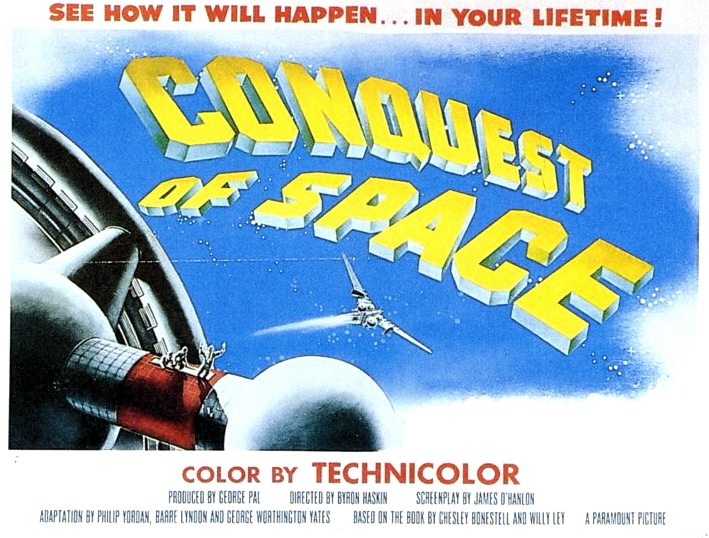
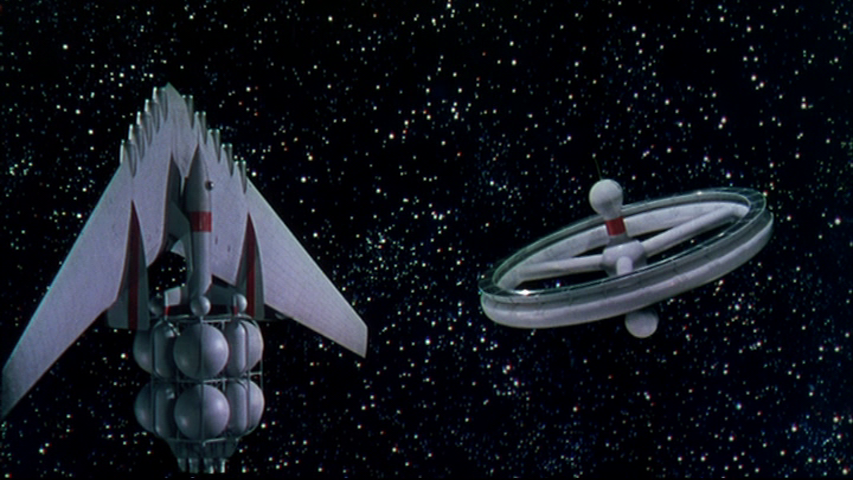
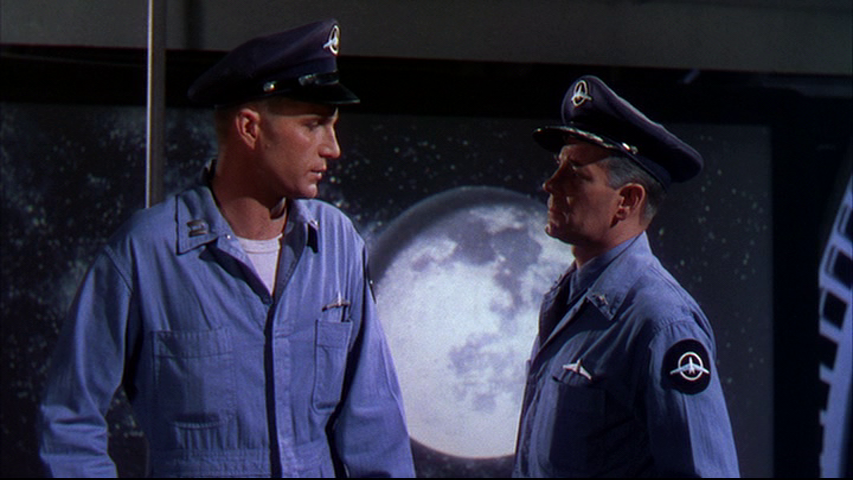
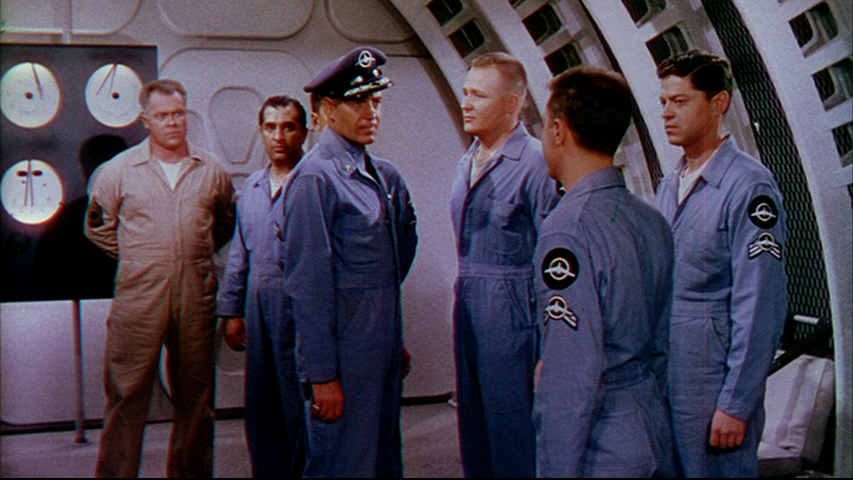
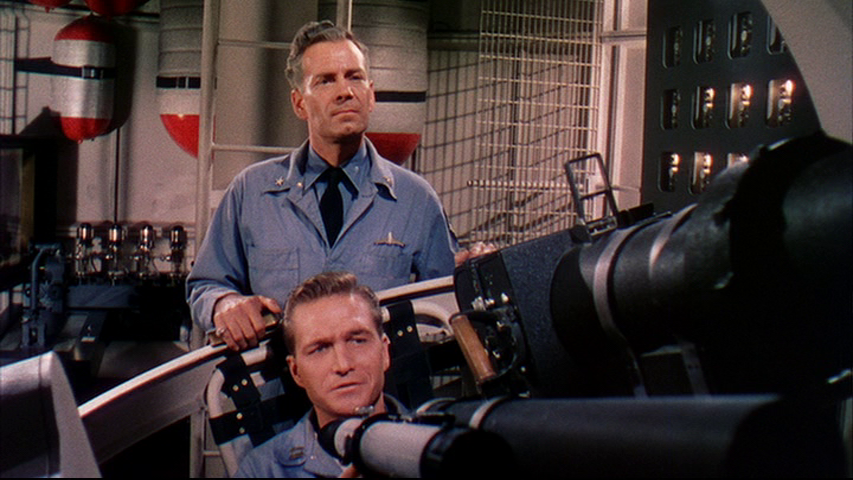
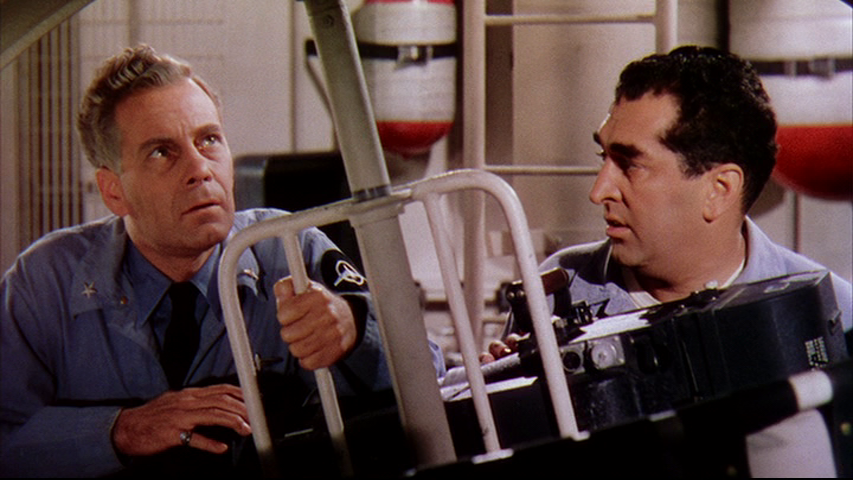
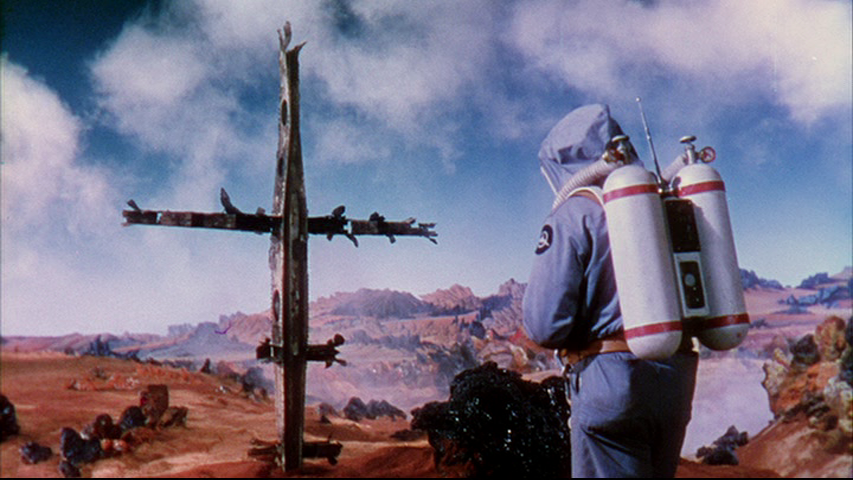
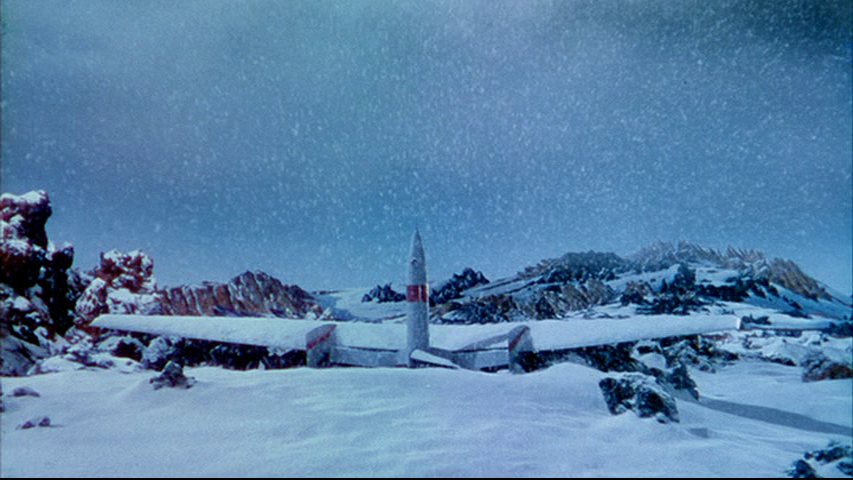
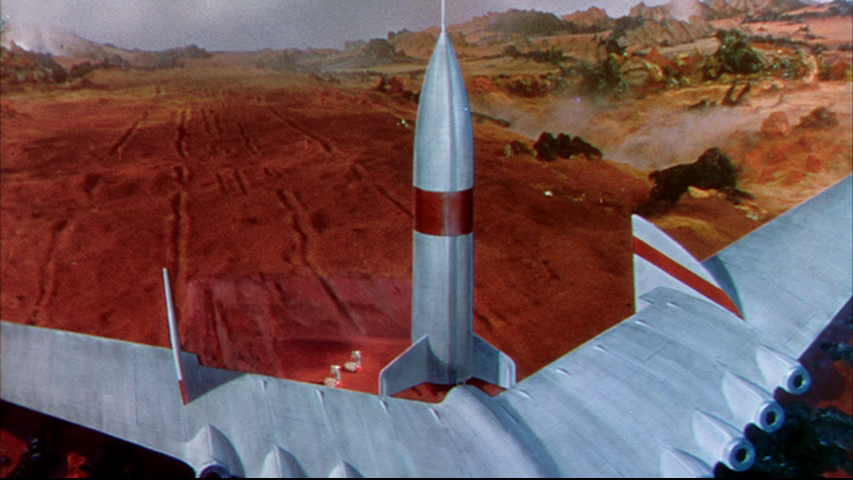

No comments:
Post a Comment